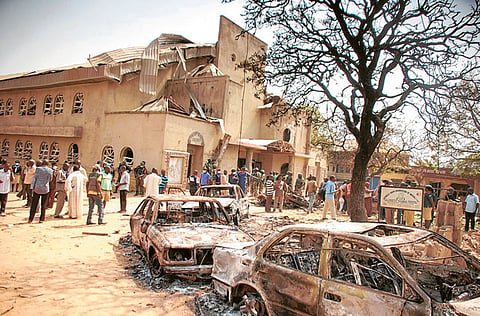Boko Haram no regional threat
In Nigeria, a fanatical ideology often cloaks far more local economic and tribal rivalries

The recent spate of brutal attacks in Nigeria by Boko Haram, a local militant group professing allegiance to Al Qaida, has drawn attention to West Africa as the next regional battleground for militancy.
But the operative word here is local, not regional — despite such worries in parts of Africa and the West. This week, UN Secretary-General Ban Ki-moon shared a report with Nigeria's foreign minister that raised "growing concern in the region" about possible links between Boko Haram, based in Nigeria's Muslim north, and Al Qaida in the Islamic Maghreb, known as AQIM.
Senior US officials, too, are worried about such a connection, as well as links to Al Shabab, in Somalia. As if to verify such concerns, Nigeria has closed its borders to prevent entry by outside Islamist militants.
But in Nigeria, no less than in Pakistan, a fanatical ideology often cloaks far more local economic and tribal rivalries. This deep rooting in very local political contexts and economic ambitions actually hampers the militants' efforts at forging pan-African militancy.
Boko Haram is Nigeria's most visible and vicious militant group, but it is not the only one. In the oil-rich south, the Movement for the Emancipation of the Niger Delta roams the swamps and links up with politicians in the crumbling cities.
Nor is Boko Haram (whose name means "Western education is a sin") the country's only militant group. Hisba, a collection of Islamist vigilante gangs, also operates in the north. Both tap into decades of tribal violence among Nigeria's communities, often manipulated by politicians for political gain and profit.
The groups' grievances are usually portrayed as religious. Indeed, their targets are often Christians. In 1999, the north adopted Sharia law. But that neither quelled Islamist mobilisation there nor addressed deep dissatisfaction with socioeconomic conditions and poor governance.
Instead, vociferous religious ideology often obscures violence driven more by economic factors.
For example, migration by the ethnic Hausa Fulani into Yoruba lands in northern Nigeria has produced conflict. The fact that the Yoruba are predominantly Christians and the Hausa Fulani Muslims matters only secondarily. Rather, the Hausa-Fulani Boko Haram is infusing religion into a long-churning brew of grievances about wealth and power distribution, corruption, and injustice.
The Nigerian government has responded poorly not only to the long-standing communal tensions, but also to the specific case of Boko Haram. The government has often ignored or instigated tensions, while brutally and indiscriminately overreacting to Boko Haram.
Although Nigeria's police are more capacious than most in West Africa, they overwhelmingly lack intelligence capacity and the ability to either disrupt attacks before they happen or track down real culprits who are at times connected to key local politicians.
Nuanced approach
As in much of West Africa, governance in Nigeria was for decades characterised by the predatory rapaciousness of governing elites and incomplete institutional development plaguing everything from rule of law to social services. Political competition often centred on getting access to the state to control natural resources, including oil. Governance has been based around tribal, clan, or family loyalties.
Parochial interests and loyalties also dominate militant cooperation across the region. Although AQIM, Al Shabab, and Boko Haram may communicate over the same militancy web pages and copy each other's tactics, their global proclamations often clash with their local interests and necessities.
Instead of reflexively portraying Boko Haram as a new Al Qaida affiliate, US counter-terrorism policy needs a more nuanced approach. It should exploit the natural rivalries and misunderstandings among the various militant groups. And it should avoid inadvertently driving the often competing and fractious actors together.
The US must also be cautious when considering training security forces in West Africa. Some governments there can view counter-terrorism and counter-narcotics aid as yet another form of rent to be exploited for power and profit maximisation.
Nigeria must move beyond the blunt use of lethal force by improving intelligence-gathering and building healthier civil-military relations. Sending tanks to the streets and declaring a state of emergency, as President Goodluck Jonathan did a few days ago, may appease the angry public, but it is not an effective counter-terrorism policy.
The US must encourage the Nigerian government to address the political, economic, and religious insecurities that give resonance to Boko Haram's ideology.
Finally, the Nigerian government must also empower and protect the many moderate Islamist leaders in the north who have stood up against Boko Haram even while facing assassinations. Ultimately, the real solutions to the Boko Haram menace are local.
— Christian Science Monitor
Vanda Felbab-Brown is a fellow at the Brookings Institution in Washington, DC and James J.F. Forest is associate professor at the University of Massachusetts, Lowell.


